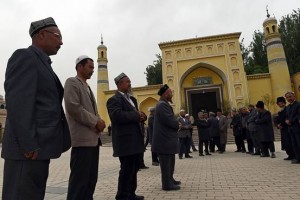Ramadan in China: Muslims are left with little to celebrate under Beijing’s Repression
The Wall Street Journal, 12 June 2016

Wall Street Journal – The Muslim festival of Ramadan began Monday, which in China means stepped up repression in the northwestern region of Xinjiang, home to 10 million Uighur Muslims. In Thailand, meanwhile, Uighur refugees in detention are on hunger strike hoping to avoid being sent back to China. If you’re wondering what genuine Islamophobia looks like, here it is.
“Party members, cadres, civil servants, students and minors must not fast for Ramadan and must not take part in religious activities,” a local Xinjiang government website declared last week, renewing what has become an annual policy. “During the Ramadan month, food and drink businesses must not close,” it added. Authorities also bar students and teachers from entering mosques, and as of last week residents in at least one prefecture must give police fingerprints and DNA samples before applying for a passport.
This belies the absurd recent claims by China’s State Council that religious freedom in Xinjiang “cannot be matched by any other period in history,” and that “there will be no interference” by local authorities in Ramadan observance. The truth is that this holiday crackdown is of a piece with the state’s long-standing practice of restricting Muslim veils, beards, Uighur-language schools and other aspects of religious and ethnic identity that the Communist Party considers threatening to its monopoly on power.
Uighurs used to be the overwhelming majority in their homeland, but for decades Beijing has exported Han Chinese to Xinjiang and today the balance is about 50-50. Official Han favoritism and efforts to snuff out Uighur identity have bred increasing resentment and violent backlash, including attacks on local security forces and acts of terror in Xinjiang and beyond. Beijing paints all Uighur rights activists as separatists and terrorists, and its sensitivity grows as the region’s energy resources and strategic proximity to Central Asia rise in importance. So repression intensifies along with resistance.
One effect is an increasing flow of Uighur refugees, including more than 70 who have been detained in Thailand since 2014. About half are on a hunger strike that began May 31, and on Monday they published an open letter. “Instead of protecting us from the imminent threat of mistreatment, torture and imprisonment upon our return, Thailand has already forcibly extradited more than 140 of us to China,” they wrote in an appeal to Thai authorities and the international community to respect their rights and keep them safe.
The refugees’ plight is complicated by Thailand’s trial of two Uighurs for a bombing at a popular Bangkok site last August that killed 20 people, including Chinese tourists, and injured more than 120. Police say the men, who claim innocence, carried out the attack to protest Thailand’s crackdown on local human-trafficking networks.
But the essential context for the Uighurs’ hunger strike is Beijing’s repression in Xinjiang and its efforts to extend its reach overseas to Thailand, Hong Kong and other places where Chinese dissidents try to hide. Beijing’s abuses are a challenge to governments world-wide—and to all those who claim to care about human rights, including the rights of Muslims.

